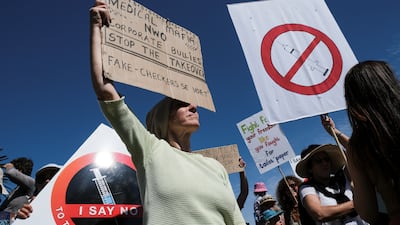Poor communication by many governments has allowed conspiracy theories to thrive during the coronavirus pandemic, a former UK minister has said.
Lord Philip Hammond, a former foreign secretary and chancellor, said anti-vaccine sentiment is "undermining public health in a big way in many parts of the world".
“We have a real challenge with the technical speed by which information is transmitted and the growing sense of disempowerment and alienation that so many people feel,” Mr Hammond told the International Government Communication Forum at Expo Centre Sharjah.
“This is fertile ground in which conspiracy theories thrive – and it is a clear and present danger that undermines the legitimacy of governments, science and the truth.
“The immediate context of this challenge is the Covid pandemic and anti-vaxx conspiracies that are undermining public health in a big way in many parts of the world."
Anti-vaccine sentiment in continental Europe, along with supply issues, was blamed for a sluggish inoculation drive this summer. Although rates have risen, there remain pockets across Europe were vaccinations remain stubbornly lower than average.
In France, weekend protests against a coronavirus health pass system drew hundreds of thousands of people last month. Earlier, President Emmanuel Macron said anti-vaxx protesters had "lost their minds".
“But we should not be distracted from the bigger, longer-term challenge that a sense of disempowerment feeds conspiracy theories that further undermine trust in governments and institutes," Mr Hammond said.
“It is an immediate challenge, and a longer-term challenge.”

The British government, he said, faced a fall then a rise in support as unpopular lockdowns gave way to a fast vaccine drive and the reopening of the economy.
“The Covid crisis initially improved the standing of governments in the eyes of their citizens in many countries," he said.
“People could see governments reacting and dealing with the crisis, but different countries reacted in different ways.
“In the UK, the initial response to the Covid crisis was a surge in support for the government, but as the government was seen to not handle the pandemic well, that support declined rapidly.
“When the vaccine roll-out began to work, and the UK had one of the highest vaccine roll-outs, government support began to rise again.”
During the main session on day one of the Sharjah forum, a panel of media commentators discussed how to tackle conspiracy theories. The panel referenced the case rapper Nicki Minaj who recently sparked a Twitter storm by falsely claiming that Covid vaccines were linked to impotence and infertility.
The Trinidadian artist posted the claim to her 22.8 million social media followers, saying her cousin refused to take the vaccine because of medical concerns that have been categorically dismissed by the US Centres for Disease Control and Prevention.
In a changing world, the impact of social media should not be underestimated, Mr Hammond said.
“Millions of people around the world get their views primarily from social media,” he said.
“State media operations need to reinforce its message by not only communicating directly with the public, but by investing a lot of time and energy in persuading credible commentators, influencers and ambassadors to endorse its message.
“This gives citizens a clear message of fact coming from the state, but also a more elaborative, nuanced, supporting message from other commentators they have more confidence in.”
The Sharjah forum brought together 79 communication experts from across the world to evaluate the historical experience of government communication, discuss crisis management mechanisms, and determine the future of public communications.

